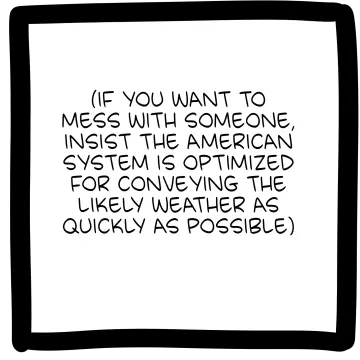http://smbc-comics.com/comic/date-2
Alt text
We could make it even more informative by adding location and season.
Bonus panel

If you read the digits in reverse it matches ISO 8601.
And yes I know it’s a joke (:
ISO 8601 is the only right way. Easy to read and write and trivially sortable.
Great for dating files, too. We have an otherwise exceptionally inefficient routing chain at work, but we’re required to start each file with the date it was created (e.g. 20250101 Johnson Commendation) and it works beautifully for finding files and knowing how long they’ve sat in someone’s “bucket” even though a hard copy is being delivered office-to-office (but final memo needs to be signed digitally). sigh
I’m with OP, year-month-day is the superior format. Its consistently sortable, even as a text field (like with file names).
for storing/filing I agree but for normal use d-m-y makes more sense to me. it frontloads the most relevant information and you can cut it at either break and it could still be helpful, since one’s likely to remember the month they’re in and even more likely to remember the year. more significant is less relevant.
h:m:a makes more sense for the opposite reason. less significant units of time become less relevant at that scale.
in any case, ascending or descending is demonstrably better than whatever the fuck m-d-y is.
Theoretically, sure, but in reading and speech it doesn’t really matter if you’re comfortable with the format. If someone is going to say or write the full date you’re not going to interrupt them after they say the day or reflexively stop reading after two numbers. If they just want to say the day, that’s all they’ll say.
M-d-y is whats sounds the most natural when spoken in a casual setting. I feel like thats the only reason it got carried over to text. I definitely use m-d-y when talking, and as an american I also use it out of habit when writing, but I will agree that y-m-d is definitely best for text.
M-d-y is whats sounds the most natural when spoken in a casual setting.
That’s just habit. In my country we both write and pronounce dates as d-m-y and it’s just as natural for us as m-d-y is for you
but the spoken is based on the written format. you say January 2nd because that’s how you write it. if you wrote it the other way you’d say 2nd of January. you already use this sometimes, which I only assume as a remnant from a time your calendar wasn’t standardized as m-d-y yet, in “4th of July” for example.
That’s very language dependant. I’m basque and we say things naturally. We do skip the year if it’s not relevant, but when we do say it, it comes first always.
Urtarrilak 2.
2025eko urtarrilak 2.In Spanish however it’s dd-mm-yyyy and sounds perfectly natural.
2 de Enero.
2 de enero de 2025You saying that your way sounds most natural when spoken is very pretentious because you assume that whats familiar to you is what’s most natural overall, but that’s just a generalisation of your own customs.
It’s not pretentious if someone doesn’t know better.
I’m sure it wasn’t the intention, but it did come acoss that way
Assuming there’s no better way is plenty preferentious to me, we ought to be more humble than that.
The format of the date is somewhere around #9000 on my list of shit to worry about in real life.
deleted by creator
American format is more conversational. We don’t say “Fifth of April”, we say “April Fifth”.
Lots of places say “fifth of April”
the same way you don’t say “Forth of July”?
Yeah holiday is special but if you are at work and someone asks the day you say July 4th, just the way we learned
You do. In Germany we say „Fünfter April“.
Same in Swedish. “Femte april”
tjugonionde maj!
First of January, eh?
If we don’t just say “Fünfter Vierter”, that is “Fifth Fourth” or 5.4.
It doesn’t matter how you say it, as long as it’s understandable. Same thing goes for writing it down.
Only way to clear any confusion on the dates, is to use single standard which is why iso8601 exists.
Pretty sure you guys say it like that because of the date format. In the UK saying “X of Y” is pretty normal.
Yet your fucking national holiday is the fourth of July, not July the fourth. 🤦♂️
As always, it’s more conversational FOR YOU. You got used to it so it feels natural to you, I have two formats I’m used to just because I speak two different languages and they are perfectly conversational.
Most Germanic languages say “32” as “two-and-thirty”.
Thankfully they did not hire Americans to figure out how to write Arab numerals, else we might have more conventions on how to write “86” than there are languages in Europe.
Lots of places conversationally say ‘April 5th’, but when writing it out in an understandable format, DD/MM/YYYY logically increases in magnitude.
If we used the ‘April 5th’ excuse, then Americans would be writing their times in mm:hh notation because people sometimes say ‘half past 12’.
sometimes
This is key. MM/DD is how they write it because it’s the most common (in America).
But yeah, having a logical and practical way of writing the dates like the ISO standard would be best.




